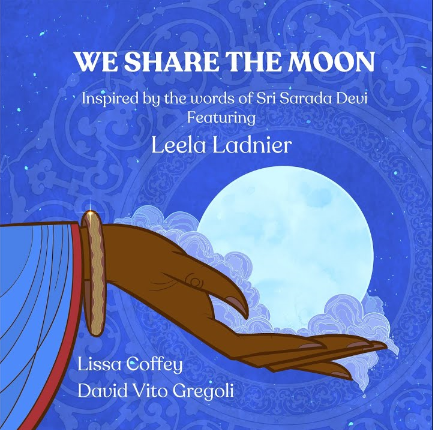Single Review–We Share the Moon
A Peaceful Call To Embrace Universal Brotherhood
Down the history, music has been a powerful vehicle to unite humanity and drive the message of peace, love and harmony. “We Share the Moon” by Lissa Coffey and David Vito Gregoli, featuring Leela Ladnier, is a musical composition inspired by the eminent spiritual leader Sri Sarada Devi. In fact, the composers released this song, part of their upcoming album, on her birthday as a tribute to her legacy. The song becomes a clarion call to experience unity and interconnectedness in pursuit of inner peace.
What highly interests me . . .
Though an unusual choice for this genre, Tabla, the famed Hindustani percussion instrument looks to me as a great choice for this song. For more than half of the length, the song moves with a gentle piece like an Indian Bhajan in the English language, before it takes the flight and becomes more universal and bring in the elements of Western style-singing. The incredible synchrony of the beats and the lyrics of the song create a magical effect no one can afford to miss out while listening to this single.
A sonic treat for the ears and the soul . . .

As the song opens, the composer intends to set up a tranquil scene aligning with the lyrics which describe a moonlit night by the Ganges River. The serene imagery, with the stillness of the Ganges water and the moon’s reflection, provides a backdrop for the overarching theme of shared experience and connection – widening into realizing universal brotherhood. The repetition of the lines “I can see the moon” emphasizes the universal nature of this experience and the connection to the celestial realm.
The chorus conveys the central message of the song, emphasizing the idea that no one in the world is a stranger because we all share the moon and the sky. This universal connection is contrasted with the advice not to place blame on others but to seek inner peace. The song enjoins the listener to find common ground and understanding instead of fostering animosity or conflict.
With the second verse, a prayerful mood envelops the listener expressing a desire for wisdom and devotion. The reference to the stained moon and the plea for a pure mind suggests an acknowledgment of imperfections and a yearning for spiritual clarity. The lyrics highlight the duality between the external world’s imperfections and the quest for inner purity.
The bridge section employs metaphors, comparing the nature of water and the mind. The water’s tendency to flow downward symbolizes the mind’s inclination towards lower thoughts, while the grace of God is presented as a force that can elevate the mind. This metaphorical exploration contributes to the spiritual depth of the song and reinforces the theme of seeking higher truths.
The third verse acknowledges the transient nature of happiness highlighting the impermanence of worldly joys. The mention of each individual having a time to tell their story adds a personal dimension to the broader theme of shared experiences. The call to let love shine everywhere, even when the moonlight hides, encourages a positive and compassionate outlook during challenging times.
Take home
“We Share the Moon” is a thoughtful and spiritually inspired composition. The lyrics weave together imagery, metaphor, and a message of universal connection, encouraging listeners to embrace shared experiences, seek inner peace, and approach others with understanding and love. The song’s serene melody, combined with its profound lyrics, creates an uplifting and contemplative musical experience you will carry in you for so long.

 Album Review—Inner Sanctum
Album Review—Inner Sanctum  Album review—Back To My Roots
Album review—Back To My Roots  Album Review—Days of Gypsy Nights
Album Review—Days of Gypsy Nights  Album Review—Open by Stephen Wallack
Album Review—Open by Stephen Wallack